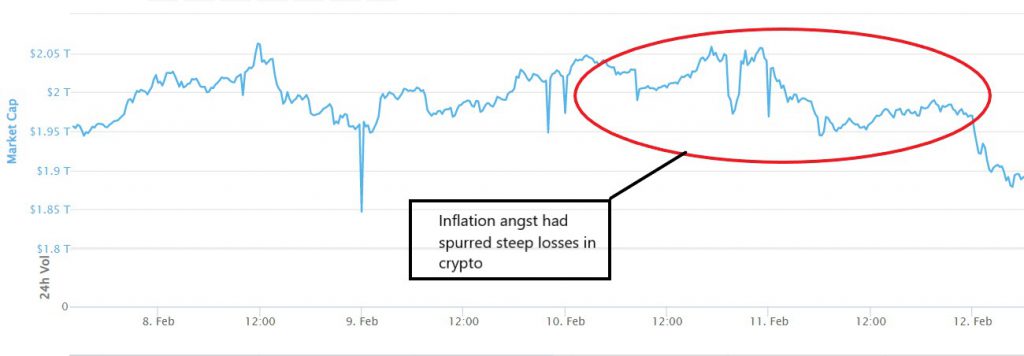With crypto markets already under pressure from Russia-Ukraine tensions, upcoming inflation data from the United States this week is set to add another layer of uncertainty. The Personal Consumption Expenditures Index (PCE) for January is due this Friday. What makes the data so important, and potentially market-moving, is that it is the preferred inflation gauge of the Federal Reserve.
With sentiment indicating “extreme fear,” a strong inflation reading could further unsettle markets already hammered by simmering Russia-Ukraine tensions.
Rising inflation also creates more space for the Fed to raise interest rates, which will reduce liquidity in markets and dent investment into risk-driven assets like stocks, and more recently, crypto.
Crypto moving in line with stock markets
As institutional interest in cryptos grew through 2021, the market has traded more in line with stocks- specifically technology stocks. For example, Bitcoin is down about 18% this year, compared to a near 16% decline in the tech-heavy Nasdaq index.
On Feb. 10, a stronger-than-expected U.S. consumer price reading saw crypto market capitalization slump by nearly $80 billion in thirty minutes. The market then doubled its losses over the next two days.
The recent volatility has also cost crypto, specifically Bitcoin, its status as a potential hedge against inflation. The token has also lagged gold by a wide margin this year.
Inflation risks this week?
The PCE index is forecast to grow by 6% in January- its fastest rise in about 40 years, Yahoo finance reported, citing data from Bloomberg. An in-line, or even stronger-than expected reading is likely to rattle markets.
The crypto market has already lost more than $100 billion this month on jitters over Russia. While it may be showing early signs of a recovery now, it is still vulnerable to any further shocks.
Twitter user @Trader4Lyf noted–
I remain bearish of traditional markets, and the “risk off” sentiment in that space will likewise affect #Crypto
Tech stocks for example look bad But like March 2020’s mini crash we decoupled in a few weeks, and so I can still be bullish for this year


